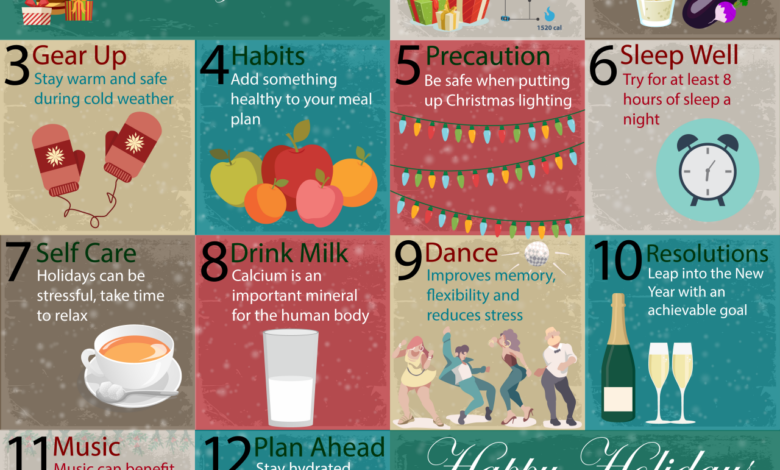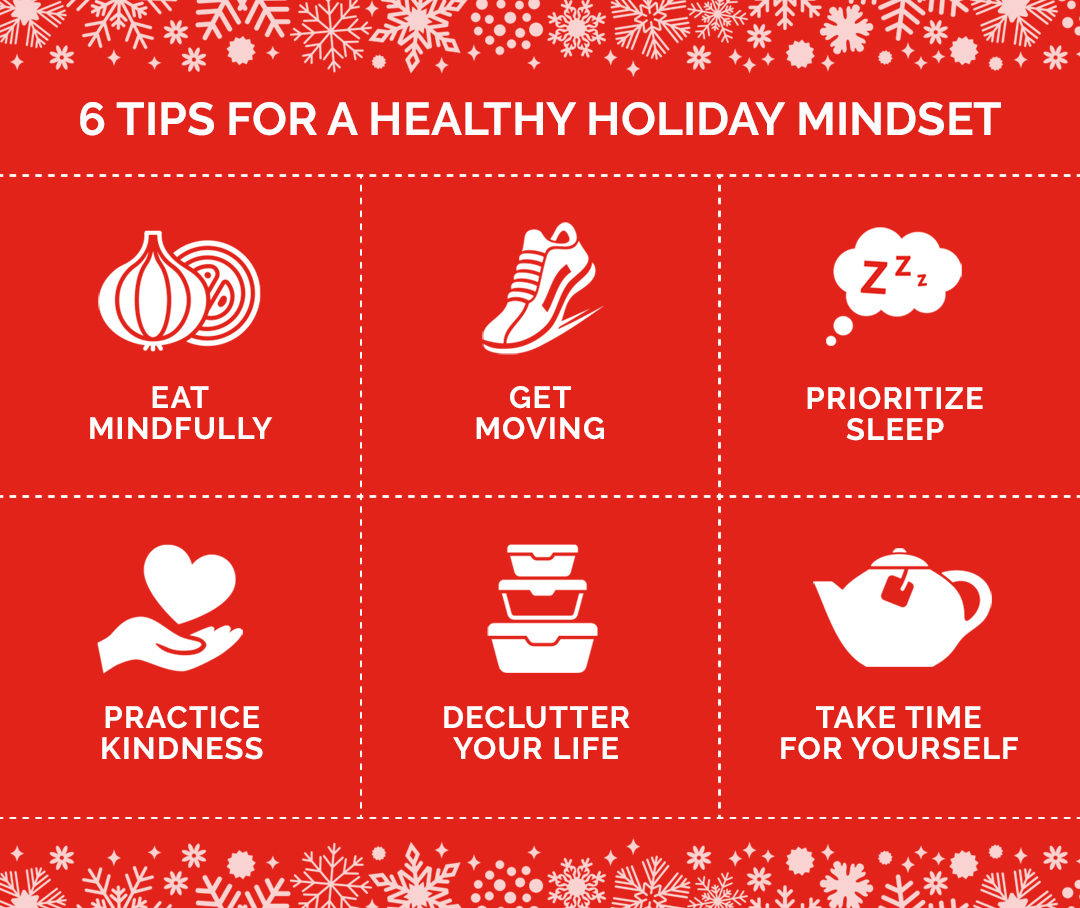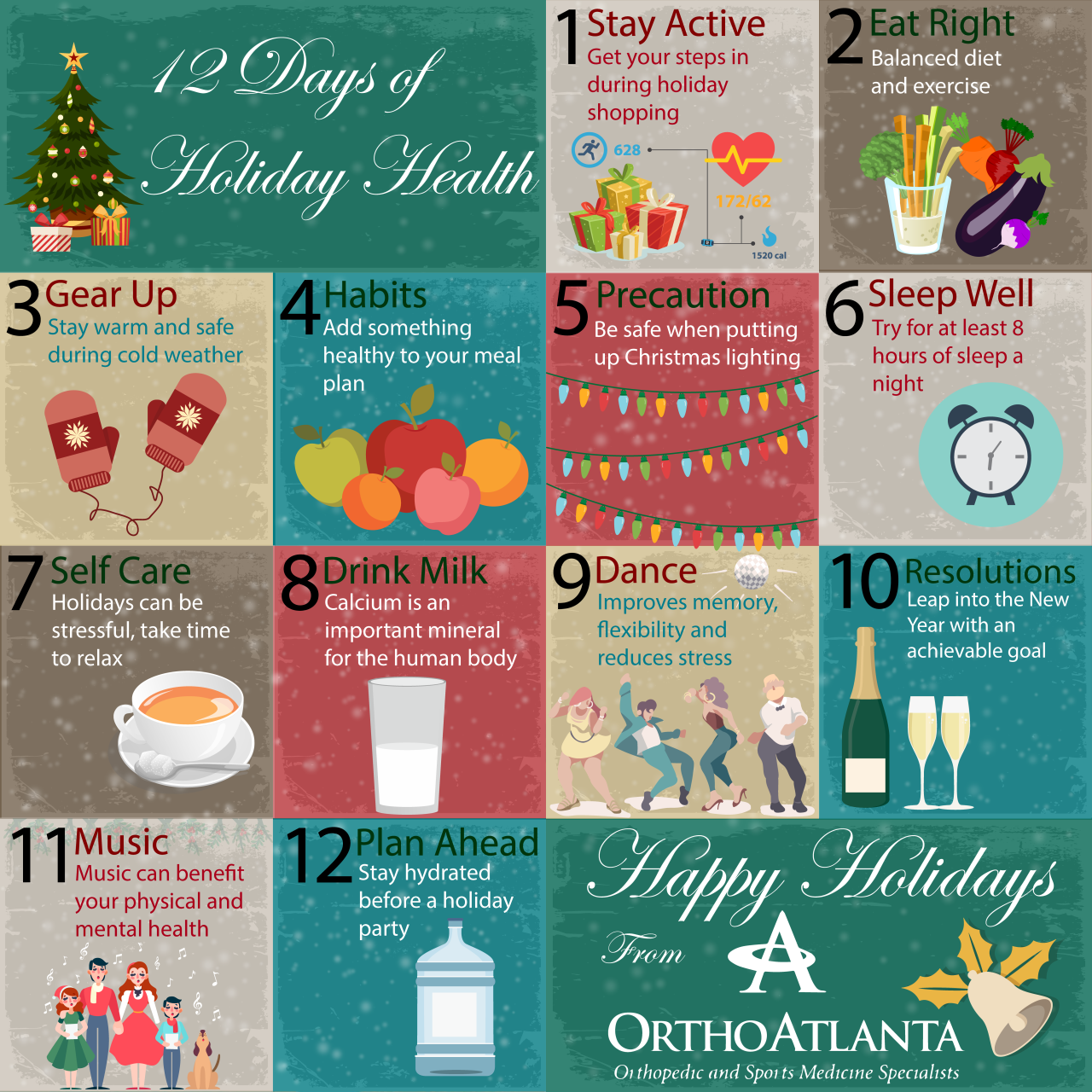
10 Healthy Holiday Travel Tips for a Stress-Free Trip
10 Healthy Holiday Travel Tips for a Stress-Free Trip: Let’s face it, traveling can be a whirlwind of excitement, but it can also take a toll on your well-being. From navigating crowded airports to adjusting to different time zones, your body can feel the strain.
But don’t worry, you can still enjoy your vacation while prioritizing your health. This guide is your roadmap to a healthier and more enjoyable travel experience, offering practical tips and strategies for staying energized, nourished, and safe throughout your journey.
We’ll cover everything from pre-trip planning and packing healthy snacks to finding opportunities for exercise on the road and making mindful choices when dining out. We’ll also explore ways to manage stress and fatigue, ensuring you return home feeling refreshed and revitalized, not exhausted and depleted.
So, buckle up, pack your bags, and let’s embark on a healthy and happy holiday adventure together.
Planning for Healthy Travel

Traveling can be a wonderful way to experience new cultures and create lasting memories, but it can also pose challenges to maintaining your health. Pre-trip planning is essential for staying healthy while traveling. By taking proactive steps to prioritize your well-being, you can minimize the risk of travel-related health issues and enjoy your trip to the fullest.
Choosing Healthy Travel Options
Making informed choices about your travel arrangements can significantly impact your overall health and well-being during your trip.
Navigating holiday travel can be a challenge, especially when it comes to staying healthy. From packing light to choosing the right snacks, it’s important to be mindful of your choices. A key to feeling good while traveling is to focus on meals that provide lasting satisfaction, and that’s where an RD approved approach to eating for fullness and satisfaction comes in.
By incorporating nutrient-dense foods and prioritizing hydration, you can keep your energy levels up and avoid those dreaded travel-induced cravings. So, with a few smart strategies and a focus on mindful eating, you can conquer your holiday travel with ease and enjoy every moment.
- Flights:Opt for direct flights whenever possible to minimize exposure to germs and potential delays. Choose airlines that offer healthy meal options and ample legroom to promote comfort and circulation. Consider purchasing a seat with extra legroom for added comfort, especially for long flights.
- Accommodation:Research hotels or accommodations that offer healthy amenities, such as gyms, swimming pools, and access to fresh fruits and vegetables. Look for options with clean and well-maintained facilities, especially if you have allergies or sensitivities.
- Transportation:Consider using public transportation, walking, or cycling as a way to get around your destination. Not only is this often a more affordable option, but it also provides a great opportunity for exercise and to experience the local culture.
When necessary, choose reputable taxi or ride-sharing services, and be mindful of the hygiene and safety standards of the vehicles.
Packing Healthy Snacks and Beverages
Bringing your own snacks and beverages can help you avoid unhealthy temptations and ensure you have healthy options available when you need them.
Staying healthy while traveling is crucial, especially during the holidays. You can easily incorporate exercise into your trip by finding a quiet corner in your hotel room and doing a quick workout. Try my 9-minute total body bodyweight workout , which can be done anywhere without equipment.
This will help you maintain your fitness routine and keep your energy levels up while you explore new destinations. Remember, keeping active can enhance your overall holiday experience!
- Snacks:Pack a variety of nutritious snacks such as nuts, seeds, dried fruit, whole-grain crackers, and protein bars. These snacks will provide sustained energy and keep you feeling full, reducing the urge to overeat unhealthy foods.
- Beverages:Bring a reusable water bottle and fill it up frequently throughout your trip. Avoid sugary drinks and opt for water, unsweetened tea, or infused water.
Researching Local Markets and Grocery Stores
Exploring local markets and grocery stores can be a fun and rewarding experience.
- Local Markets:Local markets are often a great source of fresh produce, fruits, vegetables, and other healthy ingredients. You can also discover unique regional specialties and support local farmers.
- Grocery Stores:Familiarize yourself with the grocery stores in your destination to find healthy options. Look for stores with a good selection of fresh produce, whole grains, lean proteins, and dairy alternatives.
Staying Active While Traveling
It’s easy to fall into a sedentary routine when you’re on vacation, but staying active is essential for both your physical and mental well-being. A little planning can go a long way in ensuring you get your daily dose of movement while exploring new destinations.
Designing a Workout Routine for Travel
To ensure you can maintain your fitness routine while traveling, it’s essential to plan ahead. This includes creating a workout routine that can be easily incorporated into your travel schedule. Consider your available time, space, and resources. For example, if you’re staying in a hotel, you can utilize the fitness center or even your room for a quick workout.
Pack a few essentials like resistance bands, a jump rope, and workout clothes to make it easier to exercise wherever you go. If you’re traveling for an extended period, look for gyms or fitness studios in your destination and plan your workout sessions in advance.
Finding Opportunities for Physical Activity at Destinations
Many destinations offer numerous opportunities for physical activity. From hiking and biking to swimming and kayaking, there are plenty of ways to stay active while exploring. Research your destination before your trip to discover local parks, trails, and fitness classes.
Many hotels also offer complimentary activities such as yoga classes or fitness sessions.
Benefits of Walking or Exploring Local Areas on Foot
Walking is a fantastic way to stay active and experience a new place. It allows you to discover hidden gems, immerse yourself in the local culture, and get a good workout. Walking also offers several health benefits, including:* Improved cardiovascular health: Walking helps strengthen your heart and lungs.
Weight management
Walking is a great way to burn calories and maintain a healthy weight.
Reduced risk of chronic diseases
Regular walking can lower your risk of developing conditions such as heart disease, stroke, type 2 diabetes, and some types of cancer.
Traveling during the holidays can be a whirlwind of delicious food and tempting treats. While it’s great to indulge a bit, it’s also important to keep your health in mind. One of my favorite tips for staying on track is to focus on building healthier holiday plates, which you can learn more about here.
By making mindful choices, you can enjoy the festivities without sacrificing your well-being. And don’t forget to pack some healthy snacks for the journey, too! It’s all about finding that balance so you can truly enjoy your holiday travels.
Improved mood
Walking releases endorphins, which have mood-boosting effects.
Staying Hydrated During Travel, 10 healthy holiday travel tips
Staying hydrated is crucial, especially when traveling. Travel can dehydrate you due to factors like dry air in airplanes and long hours spent outdoors. Make sure to drink plenty of water throughout your trip. Avoid sugary drinks and alcohol, which can dehydrate you further.
Carry a reusable water bottle with you and refill it frequently.
Eating Healthy on the Road
Traveling can be a challenge when it comes to maintaining a healthy diet. With tempting fast food options and limited access to fresh produce, it’s easy to fall into unhealthy eating habits. However, with a little planning and effort, you can enjoy delicious and nutritious meals while on the go.
Making Healthy Choices at Airports
Airports are notorious for their abundance of unhealthy food options. However, there are still ways to make healthier choices. Look for restaurants that offer salads, grilled chicken or fish, and whole-grain sandwiches. You can also bring your own snacks, such as fruits, vegetables, nuts, and seeds, to avoid the temptation of airport fast food.
Eating Healthy at Restaurants
Dining out can be a challenge when trying to eat healthy. However, there are a few strategies you can use to make healthier choices. When ordering, opt for grilled or baked dishes over fried options. Request your food to be prepared without butter, oil, or salt.
Choose lean protein sources such as fish, chicken, or tofu.
Healthy Hotel Food Options
Most hotels offer a continental breakfast, which typically includes fruit, yogurt, and cereal. These are all good choices for a healthy start to your day. If you’re staying in a hotel with a restaurant, look for menu items that are grilled, baked, or steamed.
Many hotels also offer room service, which can be a convenient option for healthy meals.
The Importance of Avoiding Processed Foods and Sugary Drinks
Processed foods are often high in calories, unhealthy fats, and added sugars. They can also be low in nutrients. Sugary drinks, such as soda and juice, are also high in calories and can contribute to weight gain.
Examples of Healthy Travel Snacks
| Snack | Calories | Protein (g) | Carbohydrates (g) | Fat (g) ||—|—|—|—|—|| Apple | 100 | 0 | 25 | 0 || Banana | 105 | 1 | 27 | 0 || Trail Mix | 200 | 6 | 20 | 10 || Hard-Boiled Egg | 78 | 6 | 0 | 5 || Greek Yogurt | 150 | 20 | 17 | 5 |
Remember to choose snacks that are low in calories, high in protein and fiber, and free of added sugars.
Managing Stress and Fatigue
Travel can be exciting, but it can also be stressful. Long flights, unfamiliar environments, and tight schedules can all contribute to anxiety and fatigue. Here are some strategies for managing stress and staying energized during your holiday travels.
Managing Stress and Anxiety
Travel can be a source of stress, especially if you’re prone to anxiety. To minimize stress, it’s important to have a plan and be prepared for the unexpected. Here are some tips for managing stress and anxiety during your travels:
- Pack light: Carrying too much luggage can be physically and mentally draining. Packing light will help you avoid unnecessary stress and keep you feeling more relaxed. Consider using a carry-on bag only, if possible.
- Plan ahead: Knowing where you’re going and what you’re doing can help reduce anxiety. Research your destination, book accommodations in advance, and plan your activities. Having a basic itinerary can help you feel more in control and less overwhelmed.
- Be flexible: Things don’t always go according to plan. Be prepared to adjust your itinerary if necessary and embrace the unexpected. Flexibility will help you avoid unnecessary stress and frustration.
- Take breaks: It’s important to take breaks throughout your trip, especially if you’re feeling overwhelmed or stressed. Step away from your itinerary and do something relaxing, like taking a walk, reading a book, or enjoying a cup of tea.
- Practice relaxation techniques: Techniques like deep breathing, meditation, or progressive muscle relaxation can help calm your mind and body. Practice these techniques regularly, especially when you’re feeling stressed.
- Talk to someone: If you’re feeling overwhelmed, talk to a friend, family member, or travel companion. Sharing your concerns can help you feel less alone and more in control.
Getting Enough Sleep
Getting enough sleep is essential for managing stress and maintaining your energy levels. Travel can disrupt your sleep patterns, making it difficult to get a good night’s rest. Here are some tips for getting enough sleep while traveling:
- Maintain a consistent sleep schedule: Try to go to bed and wake up around the same time each day, even when you’re traveling. This will help regulate your body’s natural sleep-wake cycle.
- Create a relaxing bedtime routine: Wind down before bed by taking a warm bath, reading a book, or listening to calming music. Avoid screen time for at least an hour before bed, as the blue light emitted from electronic devices can interfere with sleep.
- Make your sleeping environment comfortable: Ensure your hotel room is dark, quiet, and cool. Use earplugs and an eye mask if necessary to block out noise and light.
- Avoid caffeine and alcohol before bed: These substances can interfere with sleep quality.
- Take a short nap during the day: A 20-30 minute nap can help improve alertness and reduce fatigue, but avoid napping for too long, as it can disrupt your sleep cycle.
Staying Safe and Healthy: 10 Healthy Holiday Travel Tips

Traveling can be an exhilarating experience, but it’s crucial to prioritize your safety and well-being. Taking proactive measures to safeguard yourself from illness and injury can ensure a smooth and enjoyable journey.
Travel Insurance and Health Precautions
Travel insurance offers peace of mind, protecting you against unexpected medical emergencies, travel disruptions, and lost belongings. It’s particularly essential when traveling to remote destinations or engaging in adventurous activities. Before embarking on your trip, it’s wise to consult your doctor for recommended vaccinations and health precautions.
They can advise you on necessary medications, travel advisories, and potential health risks associated with your destination.
Protecting Yourself from Illness and Injury
Staying healthy while traveling requires vigilance and a few simple precautions.
- Practice good hygiene:Frequent handwashing with soap and water or using alcohol-based hand sanitizer can significantly reduce the risk of contracting infections. Avoid touching your face, especially your eyes, nose, and mouth, to prevent the spread of germs.
- Stay hydrated:Dehydration can weaken your immune system and make you more susceptible to illness. Drink plenty of water, especially when traveling to hot climates. Avoid sugary drinks and excessive alcohol consumption.
- Be mindful of food and water safety:Consume food from reputable establishments and avoid street vendors unless you’re certain of their hygiene standards. Stick to bottled or boiled water to prevent waterborne illnesses.
- Protect yourself from the sun:Wear sunscreen with an SPF of 30 or higher, sunglasses, and a hat to shield yourself from harmful UV rays, especially during prolonged outdoor activities.
- Be cautious of mosquito bites:Mosquitoes can transmit diseases like malaria and dengue fever. Use insect repellent, wear long clothing, and sleep under mosquito nets to minimize the risk of bites.
Common Travel Health Risks and Avoidance Strategies
Travelers should be aware of common health risks associated with different destinations.
- Food poisoning:This is a common travel ailment, often caused by contaminated food or water. Avoid eating uncooked or undercooked food, and choose restaurants with good hygiene practices.
- Altitude sickness:When traveling to high altitudes, it’s important to acclimatize gradually to prevent altitude sickness. Symptoms include headache, nausea, and shortness of breath. Consider taking altitude medication if needed.
- Jet lag:This occurs due to the disruption of your body’s natural sleep-wake cycle during long flights. Adjust your sleep schedule gradually before and after your trip to minimize the effects of jet lag.
- Traveler’s diarrhea:This is a common digestive ailment caused by bacteria or viruses. Practice good hygiene, drink bottled water, and avoid raw fruits and vegetables to reduce the risk of traveler’s diarrhea.
Packing a Basic Travel First-Aid Kit
Having a basic first-aid kit on hand can be invaluable during your travels.
“A well-stocked first-aid kit can help you handle minor injuries and ailments, saving you time and stress.”
- Pain relievers:Include over-the-counter pain relievers like ibuprofen or acetaminophen for headaches, muscle aches, and fever.
- Antihistamines:Pack antihistamines for allergies, such as itchy eyes, sneezing, and skin rashes.
- Anti-diarrheal medication:This can help alleviate symptoms of traveler’s diarrhea.
- Motion sickness medication:If you’re prone to motion sickness, pack medication to prevent nausea and vomiting.
- Antiseptic wipes:These are useful for cleaning wounds and disinfecting surfaces.
- Bandages and gauze:Include bandages and gauze for minor cuts and scrapes.
- Antibiotic ointment:This can help prevent infection in minor wounds.
- Insect repellent:Pack insect repellent to protect yourself from mosquito bites and other insects.
- Sunscreen:Don’t forget sunscreen to protect your skin from the sun’s harmful rays.
Epilogue
By incorporating these 10 healthy holiday travel tips into your routine, you’ll not only enhance your travel experience but also ensure you return home feeling energized and rejuvenated. Remember, taking care of yourself while on the road is not about deprivation; it’s about making smart choices that support your well-being and allow you to fully embrace the joys of travel.
So, go forth, explore the world, and make lasting memories, all while prioritizing your health and happiness.

